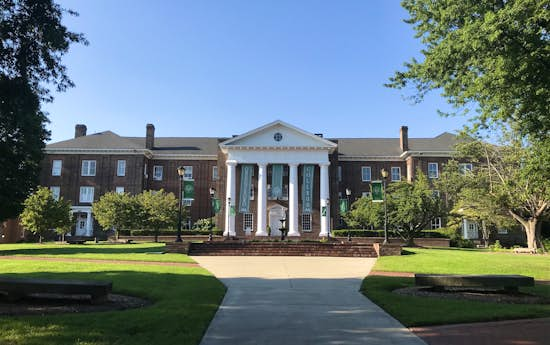22 results
List of 3.3 GPA Colleges
Displaying 22 colleges where your 3.3 GPA is within the typical range of past accepted students. You have a chance at being accepted but admission may be challenging at more selective colleges. Hint: Filter by admission chance for 63 target schools (good chance), 48 reach (harder) schools and 45 safety (easier) schools you can consider.
East Carolina University
Public 4 Year
4 reviews
3.33 Average GPA
Public 4 Year
4 reviews
#9 Best Public Universities in North Carolina
- 27,151enrollment
- $14,410net price
- 92%acceptance rate
- 1020-1170SAT range
- 19-24ACT range
Western Carolina University
Public 4 Year
10 reviews
3.44 Average GPA
Public 4 Year
10 reviews
#10 Best Public Universities in North Carolina
- 11,635enrollment
- $13,022net price
- 85%acceptance rate
- 1020-1240SAT range
- 19-26ACT range
Applications Due Mar 1
Wingate University
Private 4 Year
0 reviews
3.33 Average GPA
Private 4 Year
0 reviews
#13 Best Private Colleges in North Carolina
- 3,396enrollment
- $18,823net price
- 86%acceptance rate
- 980-1180SAT range
- 18-24ACT range
North Carolina Central University
Public 4 Year
1 reviews
3.27 Average GPA
Public 4 Year
1 reviews
#11 Best Public Universities in North Carolina
- 7,553enrollment
- $13,708net price
- 84%acceptance rate
- 810-1130SAT range
- 15-23ACT range
Applications Due Aug 1
Fayetteville State University
Public 4 Year
2 reviews
3.11 Average GPA
Public 4 Year
2 reviews
#16 Best Public Universities in North Carolina
- 6,787enrollment
- $6,355net price
- 81%acceptance rate
- 870-1060SAT range
- 14-19ACT range
Applications Due Aug 1
Queens University of Charlotte
Private 4 Year
0 reviews
3.41 Estimated Average GPA
Private 4 Year
0 reviews
#4 Best Private Colleges in North Carolina
- 1,873enrollment
- $29,459net price
- 71%acceptance rate
- 1080-1255SAT range
- 22-29ACT range
Applications Due Sep 7
University of North Carolina at Asheville
Public 4 Year
0 reviews
3.49 Average GPA
Public 4 Year
0 reviews
#5 Best Public Universities in North Carolina
- 2,914enrollment
- $14,730net price
- 74%acceptance rate
- 1145-1340SAT range
- 21-28ACT range
Applications Due Aug 1
Lenoir Rhyne University
Private 4 Year
0 reviews
3.41 Average GPA
Private 4 Year
0 reviews
- 2,354enrollment
- $21,843net price
- 83%acceptance rate
- -SAT range
- -ACT range
University of North Carolina at Pembroke
Public 4 Year
1 reviews
3.44 Average GPA
Public 4 Year
1 reviews
#14 Best Public Universities in North Carolina
- 7,666enrollment
- $8,208net price
- 90%acceptance rate
- 890-1140SAT range
- 16-21ACT range
Applications Due May 1
Belmont Abbey College
Private 4 Year
1 reviews
3.32 Average GPA
Private 4 Year
1 reviews
#14 Best Private Colleges in North Carolina
- 1,501enrollment
- $23,522net price
- 97%acceptance rate
- 950-1140SAT range
- 18-26ACT range
Elizabeth City State University
Public 4 Year
0 reviews
3.16 Average GPA
Public 4 Year
0 reviews
#13 Best Public Universities in North Carolina
- 2,149enrollment
- $4,120net price
- 74%acceptance rate
- 850-1070SAT range
- 16-22ACT range
Applications Due Jun 30
Laurel University
Private 4 Year
0 reviews
3.16 Estimated Average GPA
Private 4 Year
0 reviews
- 158enrollment
- $19,269net price
- 100%acceptance rate
- -SAT range
- -ACT range
St. Andrews University
Private 4 Year
0 reviews
3.13 Average GPA
Private 4 Year
0 reviews
- 809enrollment
- $31,864net price
- 65%acceptance rate
- -SAT range
- -ACT range
Guilford College
Private 4 Year
0 reviews
3.14 Average GPA
Private 4 Year
0 reviews
#11 Best Private Colleges in North Carolina
- 1,167enrollment
- $23,882net price
- 84%acceptance rate
- 910-1180SAT range
- 18-25ACT range
Greensboro College
Private 4 Year
0 reviews
3.35 Average GPA
Private 4 Year
0 reviews
- 826enrollment
- $19,581net price
- 84%acceptance rate
- 900-1100SAT range
- 16-22ACT range
Barton College
Private 4 Year
1 reviews
3.25 Average GPA
Private 4 Year
1 reviews
#17 Best Private Colleges in North Carolina
- 1,265enrollment
- $23,443net price
- 95%acceptance rate
- 970-1150SAT range
- 17-23ACT range
Mars Hill University
Private 4 Year
0 reviews
3.5 Average GPA
Private 4 Year
0 reviews
- 1,032enrollment
- $17,721net price
- 74%acceptance rate
- -SAT range
- -ACT range
Pfeiffer University
Private 4 Year
2 reviews
3.18 Average GPA
Private 4 Year
2 reviews
#8 Best Private Colleges in North Carolina
- 1,076enrollment
- $21,575net price
- 69%acceptance rate
- 891-1165SAT range
- 18-25ACT range
Applications Due Aug 15


















